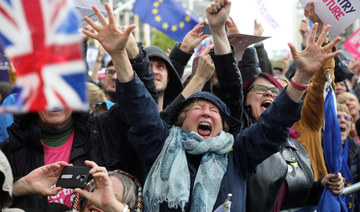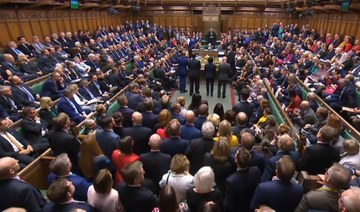LONDON: Prime Minister Boris Johnson’s plan to lead Britain out of the European Union at the end of this month hit another roadblock Monday when the speaker of the House of Commons rejected his attempt to hold a new vote of lawmakers on his Brexit divorce deal.
The ruling by Speaker John Bercow plunged the tortuous Brexit process back into grimly familiar territory: grinding parliamentary warfare.
With just 10 days to go until the UK is due to leave the bloc on Oct. 31, Johnson’s government was seeking a “straight up-and-down vote” on the agreement he struck last week with the 27 other EU nations.
The request came just two days after lawmakers voted to delay approving the Brexit deal. Bercow refused to allow it because parliamentary rules generally bar the same measure from being considered a second time during the same session of Parliament unless something has changed.
Bercow — whose rulings in favor of backbench lawmakers have stymied government plans more than once before — said the motion proposed by the government was “in substance the same” as the one Parliament dealt with on Saturday. He said it would be “repetitive and disorderly” to allow a new vote Monday.
On Saturday — Parliament’s first weekend sitting since the 1982 Falklands War — lawmakers voted to make support for the Brexit deal conditional on passing the legislation to implement it.
Johnson’s Conservative government will now go to its Plan B: get Parliament’s backing for his Brexit blueprint by passing the legislation, known as the Withdrawal Agreement Bill. The government plans to publish the bill later Monday and hopes to have it become law by Oct. 31.
But it’s unclear whether Johnson has either the time or the numbers to make that happen.
Passing a bill usually takes weeks, but the government wants to get this one done in 10 days. Johnson needs a majority in Parliament to pass it, but his Conservatives hold just 288 of the 650 House of Common seats.
The process also gives lawmakers another chance to scrutinize — and possibly change— the legislation.
Opposition lawmakers plan to seek amendments that could substantially alter the bill, for example by adding a requirement that the Brexit deal be put to voters in a new referendum. The government says such an amendment would wreck its legislation and it will withdraw the bill if it succeeds.
Brexit Secretary Stephen Barclay urged lawmakers to back the bill and — more than three years after British voters narrowly voted to leave the EU — “enable us to move onto the people’s priorities like health, education and crime.”
“This is the chance to leave the EU with a deal on Oct. 31,” he said. “If Parliament wants to respect the referendum, it must back the bill.”
With the Brexit deadline looming and British politicians still squabbling over the country’s departure terms, Johnson has been forced to ask the EU for a three-month delay to Britain’s departure date.
He did that, grudgingly, to comply with a law passed by Parliament ordering the government to postpone Brexit rather than risk the economic damage that could come from a no-deal exit. But Johnson accompanied the unsigned letter to the EU late Saturday with a second note saying that he personally opposed delaying the UK’s Oct. 31 exit.
Pro-EU activists, who took the government to court in Scotland to ensure that it complied with the law, said the second letter might amount to an attempt to frustrate the legislation. Scotland’s highest court said Monday it would keep the case open, retaining the power to censure Johnson’s government until its obligations under the law have been complied with “in full.”
The claimants’ lawyer, Elaine Motion, said the ruling meant “the sword of Damocles remains hanging” over the government.
The bloc said the fact Johnson had not signed the letter was irrelevant.
European Commission spokeswoman Mina Andreeva said Monday that European Council President Donald Tusk had acknowledged receiving the Brexit extension request and was now talking with the EU’s other 27 leaders about it.
Those 27 EU leaders are weary of the long-running Brexit saga but also want to avoid a no-deal British exit, which would damage economies on both sides of the Channel.
Germany’s economy minister suggested it could be a few days before the EU decided to respond to the Brexit delay request.
“We will have somewhat more clarity in the coming days, and we will then exercise our responsibility and quickly make a decision,” Germany’s Peter Altmaier said.
He told Deutschlandfunk radio that he wouldn’t have a problem with an extension by “a few days or a few weeks” if that rules out a no-deal Brexit.
But French President Emmanuel Macron, who had a phone call with Johnson over the weekend, called for a quick clarification of the UK’s position. In a statement, he said a delay “would not be in any party’s interest.”
France’s junior minister for European affairs, Amelie de Montchalin, told French news broadcaster BFM TV there would have to be some reason for the delay, such as a parliamentary election in Britain or a new British referendum on Brexit.
UK Commons speaker deals new blow to Johnson’s Brexit plan
UK Commons speaker deals new blow to Johnson’s Brexit plan

- John Bercow plunged the tortuous Brexit process back into grimly familiar territory: grinding parliamentary warfare
- Johnson’s government was seeking a “straight up-and-down vote” on the agreement he struck with EU nations
Ukraine suspends consular services abroad for men of fighting age
It made an exception for documents allowing Ukrainians to return to Ukraine
KYIV: Ukraine authorities on Tuesday suspended consular services for men of fighting age living abroad, after announcing measures to bring them home amid manpower shortages in the army fighting Russia.
Ukraine’s army has been struggling to hold frontlines, partly due to a lack of soldiers over two years into Russia’s invasion.
Ukraine’s foreign affairs ministry “announced a temporary suspension of accepting new applications for consular services” for men between 18 and 60.
It made an exception for documents allowing Ukrainians to return to Ukraine.
The move would likely oblige Ukrainian men to return from abroad to undergo administrative procedures that were previously available abroad.
The government has already adopted a mobilization law, due to come into force on May 18, that toughens penalties against draft dodgers and obliges men to keep their military registration up-to-date.
The ministry said men would be able to access consular services once the law came into force and “after updating their military registration.”
“Male citizen of Ukraine aged 18 to 60 with valid military registration documents will have full access to consular services,” the ministry said.
Ukrainian men have been forbidden to leave the country since the invasion began, apart from a few exceptions.
But some lived away before the war began, and Ukrainian media estimates that thousands more illegally fled the country.
Major arrests at NYU campus as Gaza protests spread
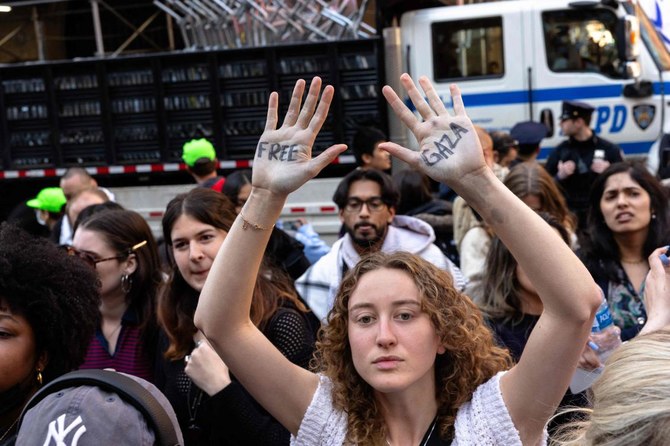
- Some of America’s most prestigious universities have been rocked by protests in recent weeks
- On Tuesday, the New York Police Department said 133 people had been arrested at NYU and released after being issued with court summons
NEW YORK: More than 130 people were arrested overnight during pro-Palestinian protests at the New York University campus, as student demonstrations gather pace in the United States over the Israel-Hamas war.
Some of America’s most prestigious universities have been rocked by protests in recent weeks as students and other agitators take over quads and disrupt campus activities.
The demonstrations come amid sweeping debates over Israel’s assault on Gaza, following Hamas’s deadly invasion on October 7.
Such bastions of higher education — Harvard, Yale, Columbia and others — are grappling for a balance between students demanding free speech rights and others who argue that campuses are encouraging intimidation and hate speech.
On Tuesday, the New York Police Department told AFP that 133 people had been arrested at NYU and released after being issued with court summons, as protests also intensify at Yale, Columbia University and other campuses.
As the holiday of Passover began Monday night, police began detaining demonstrators at an encampment at NYU who had earlier refused orders to disperse.
A New York University spokesman said the decision to call police came after additional protesters, many of whom were not thought to be affiliated with NYU, suddenly breached the barriers erected around the encampment.
This “dramatically changed” the situation, the spokesman said in a statement on the school’s website Monday, citing “disorderly, disruptive and antagonizing behavior” along with “intimidated chants and several antisemitic incidents.”
“Given the foregoing and the safety issues raised by the breach, we asked for assistance from the NYPD. The police urged those on the plaza to leave peacefully, but ultimately made a number of arrests.”
The spokesman said the school continues to support freedom of expression and the safety of students.
But protests have grown large and disruptive enough — New York Police Department spokesmen have spoken of their officers facing violence when confronting protesters at NYU — to draw the attention of President Joe Biden and his administration.
“Anti-Semitic hate on college campuses is unacceptable,” US Secretary of Education Miguel Cardona posted on X on Tuesday, expressing concern about the unrest.
The protests began last week at Columbia University, also in New York, with a large group of demonstrators establishing a so-called “Gaza Solidarity Encampment” on school grounds.
But more than 100 protesters were arrested after university authorities called the police onto Columbia’s campus Thursday, a move that seemingly escalated tensions and sparked a greater turnout over the weekend.
Social media images late Monday appeared to show pro-Palestinian Jewish students holding traditional seder meals inside the protest areas on campuses including at Columbia.
There were also demonstrations at MIT, the University of Michigan, UC Berkeley and Yale, where at least 47 people were arrested Monday after refusing requests to disperse.
France arrests eight in PKK financing probe
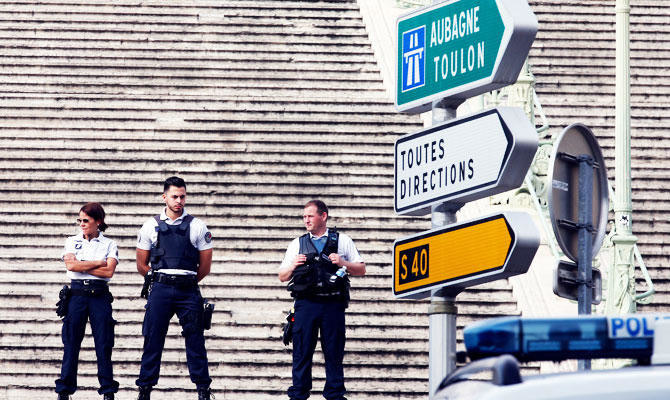
- The arrests took place in the Paris region and in southern France, the PNAT anti-terror unit said
- French prosecutors suspect the eight of preparing and financing terrorist acts
PARIS: French police arrested eight men on Tuesday as part of an investigation into the finances of the Kurdistan Workers Party (PKK), banned as a terror organization by Turkiye and its Western allies, anti-terrorism prosecutors told AFP.
The arrests took place in the Paris region and in southern France, the PNAT anti-terror unit said.
The PKK has been designated a terrorist organization by Turkiye, the United States and the European Union.
French prosecutors suspect the eight of preparing and financing terrorist acts, and of conspiring to extort, or attempt to extort, funds to finance a terrorist organistion between 2020 and 2024, the PNAT said.
Investigators believe the eight to be connected to a campaign to collect funds from Kurdish business people and other Kurds in France, a source close to the case added.
Police can hold the suspects for up to 96 hours for questioning, the source said.
Another source said the funds were destined for use in Belgium, where police on Monday raided Kurdish-run media as part of a probe undertaken at the request of a French anti-terror judge, the PNAT said.
The PKK has waged a decades-long insurgency for greater autonomy for the Kurdish minority of Turkiye in the southeast of the country, in a standoff with the Ankara government that remains unresolved to this day.
Dutch intelligence sees the wars in Gaza and Ukraine as triggers for terrorist threats
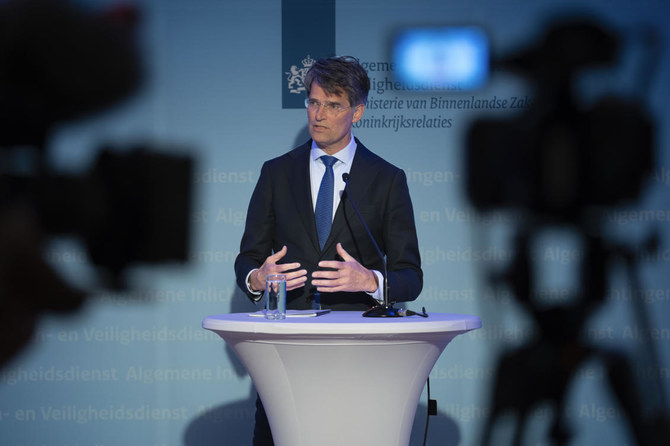
- The Israel-Hamas war in Gaza and the destruction of a Qur’an outside parliament last year are “trigger events” for extremists
- “The terrorist threat is serious at this moment,” the agency’s director-general, Erik Akerboom, told AP
ZOETERMEER, Netherlands: The Dutch national intelligence agency said Tuesday that threats targeting the Netherlands are increasingly connected to worldwide turmoil, including the wars in Gaza and Ukraine.
Although the number of terror attacks across Europe has been down in recent years, the General Intelligence and Security Service in its annual report said the Israel-Hamas war in Gaza and the destruction of a Qur’an outside parliament last year are “trigger events” for extremists.
“The terrorist threat is serious at this moment,” the agency’s director-general, Erik Akerboom, told The Associated Press.
Akerboom said he is particularly concerned about big events, noting that the agency is working closely with French authorities to prevent incidents during the Paris Olympics this summer.
In December, the Dutch counterterrorism agency increased the country’s threat alert to its second-highest level because of concerns about the Daesh group’s Khorasan affiliates, Akerboom said. IS-K, a Central Asian affiliate, was responsible for the attack at a suburban Moscow concert hall that killed at least 133 people in March.
According to the new report, “global jihadism has been the greatest terrorist threat for years in the Netherlands.” Incidents such as the one last April, when an anti-Islam activist tore pages from the Qur’an in front of the Dutch parliament building, put the Netherlands on the map of targets.
About a dozen terror attacks were thwarted by authorities in Europe last year and in four cases, suspects were arrested in the Netherlands, the report said. None of those attacks was focused on the Netherlands, according to Akerboom.
The Dutch also see threats from China, in particular cyberattacks, as a major concern. Akerboom said China is producing more hackers to break into Dutch systems than the Dutch can produce to defend them. The security service has cited China as the biggest threat to the country’s economic security.
Russia also continues to pose a risk to the Netherlands amid Moscow’s full-scale invasion of Ukraine. So-called peace protests in Amsterdam which call for the Dutch to stop sending arms to Ukraine have included demonstrators paid by Russian sources to attend and given prefabricated slogans, the security service has asserted.
The Netherlands is of particular interest to Moscow in part because of the international institutions housed here, including the International Criminal Court. The Hague-based court is investigating crimes in Ukraine and has issued arrest warrants for President Vladimir Putin and other Russians.
Sunak says UK to raise defense spending amid global threats

- “In a world that is the most dangerous it has been since the end of the Cold War, we cannot be complacent,” Sunak told reporters
- The increase in spending from 2.3 percent will see the UK become one of the highest spenders on defense in the 32-member defense alliance
WARSAW: Britain will raise defense spending to 2.5 percent of GDP by 2030 in a “most dangerous” world, Prime Minister Rishi Sunak said Tuesday during a visit to Poland.
The commitment came as NATO countries face pressure to raise defense spending in the face of global threats, particularly from Russia.
“In a world that is the most dangerous it has been since the end of the Cold War, we cannot be complacent,” Sunak told reporters in Warsaw, where he held a press conference with NATO Secretary-General Jens Stoltenberg.
The increase in spending from 2.3 percent will see the UK become one of the highest spenders on defense in the 32-member defense alliance after the United States, the British government said.
It means the UK is expected to spend £87 billion on defense in 2030-31, an increase of £23 billion over current levels.
“I believe we must do more to defend our country, our interests, and our values,” Sunak said, announcing “the biggest strengthening of national defense for a generation.”
Western nations are under pressure to boost defense funding following Moscow’s invasion of its neighbor Ukraine as well as the threat of escalation in the Middle East.
EU chief Ursula von der Leyen recently called for a “European awakening on defense and security.”
Brussels is set to come up with more proposals for financing the defense push by a summit of EU leaders in June.
Sunak has also faced calls from his Conservative Party to boost defense spending, with some calling for a level of three percent of GDP.
On Tuesday, Sunak also announced £500 million additional funding for Ukraine’s war effort against Russia.



